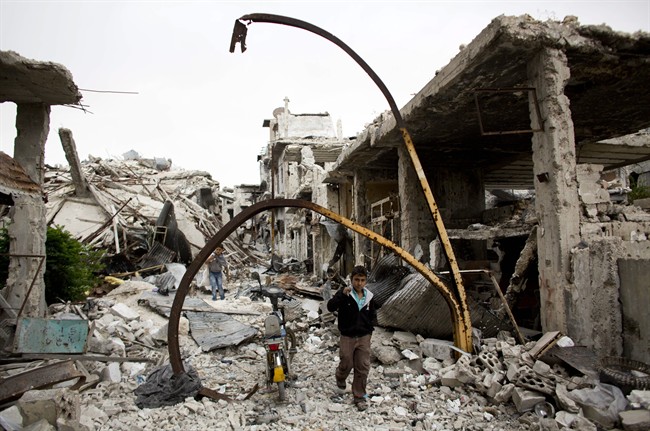U.N. investigators said Friday they are considering publishing their secret list of alleged war criminals in Syria to press for justice for the thousands of victims.

In a strong indication that they will do just that, the investigators expressed hope that releasing the names would put alleged perpetrators of torture, executions and kidnappings “on notice,” act as a deterrent and help to protect people at risk of abuse.
“It is unconscionable that Syrians should continue to suffer as they have for the last four years and have to live in a world where only limited attempts have been made to return Syria to peace, and to seek justice for the victims,” said Paulo Sergio Pinheiro, who heads the four-member independent commission charged with investigating alleged human rights violations since the Syrian conflict began in March 2011.
Some 222,000 people have been killed in the Syrian civil war according to U.N. estimates. About 6.5 million people have been displaced, and more than 3 million have fled the country.
The commission said it has kept the four lists of names it compiled for possible prosecution confidential because its investigations don’t meet the normal requirements of “due process.” But it said “not to publish names at this juncture of the investigation would be to reinforce the impunity that the commission was mandated to combat.”
The four lists were given to the U.N. human rights chief and are in a safe in Geneva. The commission said a fifth list will be delivered to High Commissioner for Human Rights Zeid Raad al-Hussein in March.
- 4 dead, 17 wounded after being caught in crossfire in entertainment district in Birmingham, Alabama
- Hundreds defrauded in door-to-door Ontario scam, Canada-wide warrants issued
- Kenneth Law responsible for ‘luring’ Ontario teen into suicide death, parents allege
- Quebec’s public security minister accuses gangs of using teens ‘to do their dirty work’
In December 2013, Zeid’s predecessor, Navi Pillay, said a growing body of evidence pointed to the involvement of senior Syrian officials, including President Bashar Assad, in crimes against humanity and war crimes. But she was careful to say she hadn’t singled him out as a suspect

Get daily National news
In a report to the U.N. General Assembly on Friday, the commission said there has been an “exponential rise in the perpetration of war crimes, crimes against humanity and human rights violations” in Syria. It said civilians continue to suffer while the many perpetrators are shielded from accountability.
The report, based on 380 interviews with victims and eyewitnesses during the six-month period ending January 15, details the massive rights violations committed by Assad’s government as well as by the Islamic State group and other rebels. The commission has conducted more than 3,556 interviews since September 2011.
It said sieges of opposition areas by the government have become longer and “more harsh,” and often include a ban on the delivery of food and medical supplies and continuous air and ground bombing. Government forces are now employing a similar strategy in Raqqa, the Islamic State group’s de facto capital, “with total disregard for the distinction between civilian and military targets,” the commission said.
Throughout 2013, 2014 and into 2015, it said “the government has made liberal use of barrel bombs,” including dropping barrel bombs with chemical agents, “likely chlorine.”
In response, Syria’s U.N. ambassador, Bashar Ja’afari, told reporters that the commission “has been biased from the beginning.”
But the report is also harshly critical of the Islamic State group, noting violent acts including executions of civilians in Raqqa and other areas it holds.
The terrorist group has also abused children “on a scale not seen before in the Syrian conflict,” training youngsters to use weapons at “cub camps,” the commission said. It is also using young boys as executioners, in combat and in suicide bombing missions. Women have suffered as well, the commission said, citing an increasing number of documented cases of sexual violence.
The commission noted last May’s vetoes by Russia and China of a U.N. Security Council resolution that would have referred the conflict in Syria to the International Criminal Court, reiterating that this remains “a key option.”
British Ambassador Mark Lyall Grant told reporters that he hopes that another attempt might have a better chance now, since the council is united in its concerns about terrorism and agrees that abuses are being committed by all sides.
“The level of abuses is such that it is absurd that … the ICC is not investigating,” Lyall Grant said.
Failing that, the commission said the council should urgently consider establishing an international tribunal to deal with alleged war crimes in Syria, possibly like those for former Yugoslavia, Sierra Leone or Cambodia.
—
Associated Press reporter Cara Anna contributed.






Comments